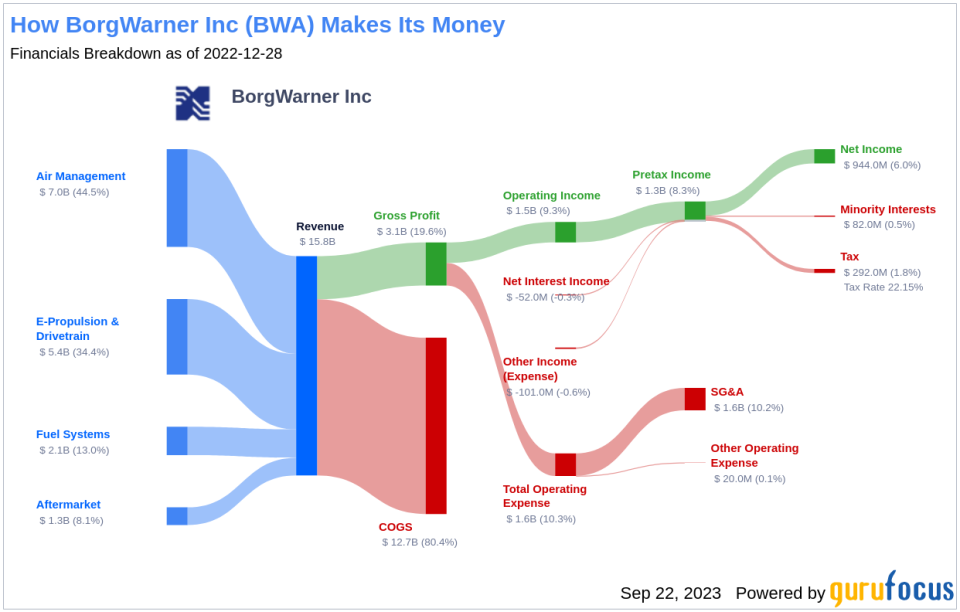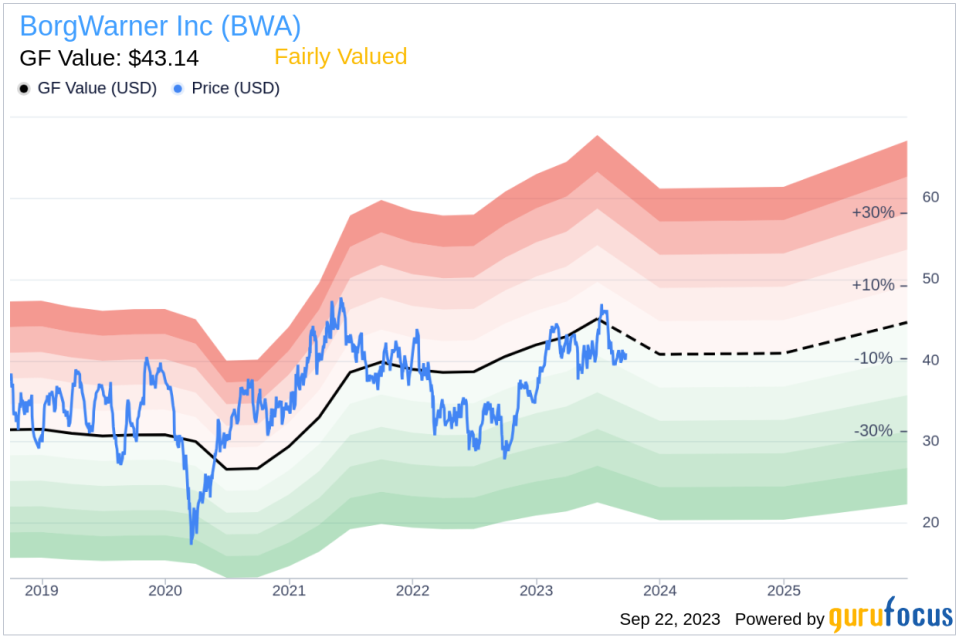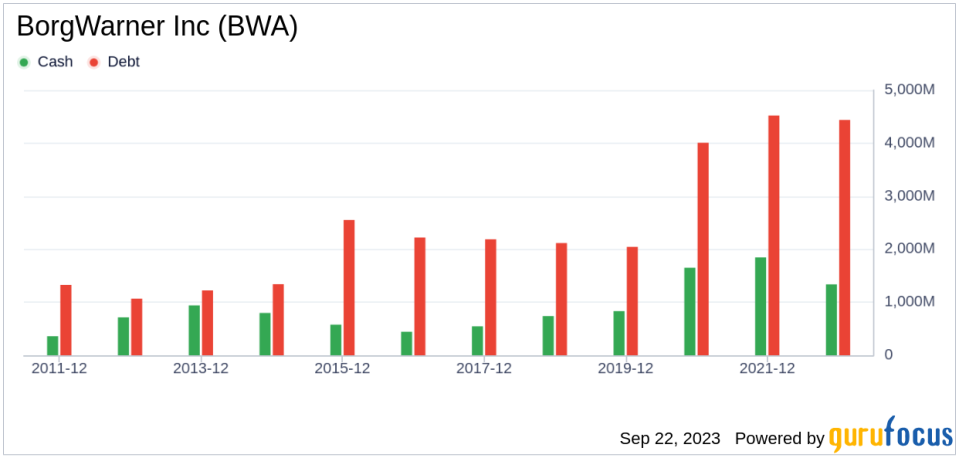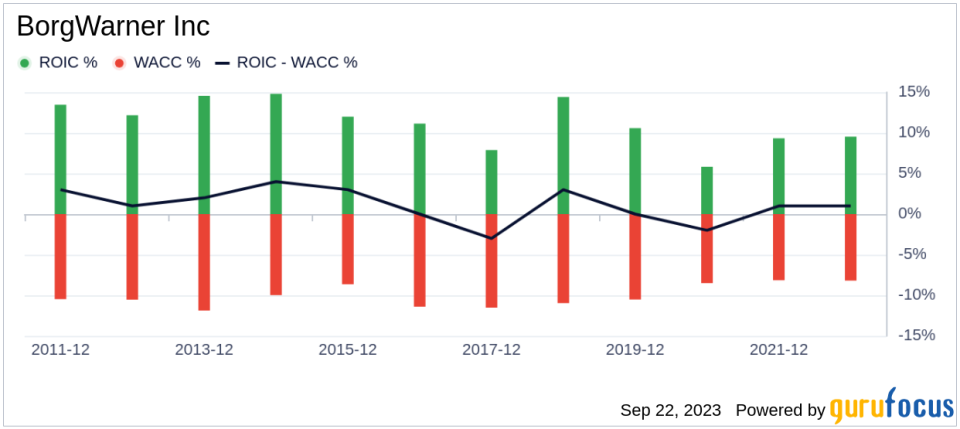Unveiling BorgWarner (BWA)'s Value: Is It Really Priced Right? A Comprehensive Guide
BorgWarner Inc (NYSE:BWA) has recently experienced a daily gain of 1.95%, with a 3-month gain of 0.6%. The company's Earnings Per Share (EPS) (EPS) stands at 4.05. But the question that arises is: Is the stock fairly valued? This article aims to answer this question by delving into a comprehensive valuation analysis of BorgWarner (NYSE:BWA). So, let's dive in to understand the company's true worth better.
Company Introduction
BorgWarner is a Tier I auto-parts supplier operating through three segments: air management, drivetrain and battery systems, and e-propulsion. The company's largest customers are Ford and Volkswagen, contributing to 13% and 8% of the 2022 revenue, respectively. Geographically, Europe, Asia, and North America each account for approximately a third of the 2022 revenue.
The stock price of BorgWarner currently stands at $40.88 per share, with a market cap of $9.60 billion. This valuation is compared against the GF Value, a proprietary measure of the stock's intrinsic value, to determine whether the stock is over, under, or fairly valued.
Understanding the GF Value
The GF Value is a proprietary measure of a stock's intrinsic value, calculated based on historical trading multiples, a GuruFocus adjustment factor based on past performance and growth, and future business performance estimates. The GF Value Line on our summary page provides an overview of the fair value that the stock should ideally trade at.
According to the GF Value, BorgWarner (NYSE:BWA) stock is estimated to be fairly valued. As BorgWarner is fairly valued, the long-term return of its stock is likely to be close to the rate of its business growth.
Assessing Financial Strength
Investing in companies with poor financial strength has a higher risk of permanent loss of capital. Thus, it is crucial to carefully review the financial strength of a company before deciding whether to buy its stock. BorgWarner has a cash-to-debt ratio of 0.19, which is worse than 75.71% of 1227 companies in the Vehicles & Parts industry. GuruFocus ranks the overall financial strength of BorgWarner at 7 out of 10, indicating that the financial strength of BorgWarner is fair.
Evaluating Profitability and Growth
Companies that have been consistently profitable over the long term offer less risk for investors who may want to purchase shares. BorgWarner has been profitable 10 over the past 10 years. Over the past twelve months, the company had a revenue of $16.90 billion and Earnings Per Share (EPS) of $4.05. Its operating margin is 9.57%, which ranks better than 76.55% of 1262 companies in the Vehicles & Parts industry. Overall, the profitability of BorgWarner is ranked 9 out of 10, indicating strong profitability.
Growth is probably the most important factor in the valuation of a company. The 3-year average annual revenue growth rate of BorgWarner is 10.7%, which ranks better than 65.67% of 1203 companies in the Vehicles & Parts industry. The 3-year average EBITDA growth rate is 1.7%, which ranks worse than 59.7% of 1077 companies in the Vehicles & Parts industry.
ROIC vs WACC
Another way to look at the profitability of a company is to compare its return on invested capital and the weighted cost of capital. Return on invested capital (ROIC) measures how well a company generates cash flow relative to the capital it has invested in its business. The weighted average cost of capital (WACC) is the rate that a company is expected to pay on average to all its security holders to finance its assets. We want to have the return on invested capital higher than the weighted cost of capital. For the past 12 months, BorgWarner's return on invested capital is 9.84, and its cost of capital is 8.58.
Conclusion
In conclusion, the stock of BorgWarner (NYSE:BWA) is estimated to be fairly valued. The company's financial condition is fair, and its profitability is strong. Its growth ranks worse than 59.7% of 1077 companies in the Vehicles & Parts industry. To learn more about BorgWarner stock, you can check out its 30-Year Financials here.
To find out the high-quality companies that may deliver above-average returns, please check out GuruFocus High Quality Low Capex Screener.
This article first appeared on GuruFocus.




